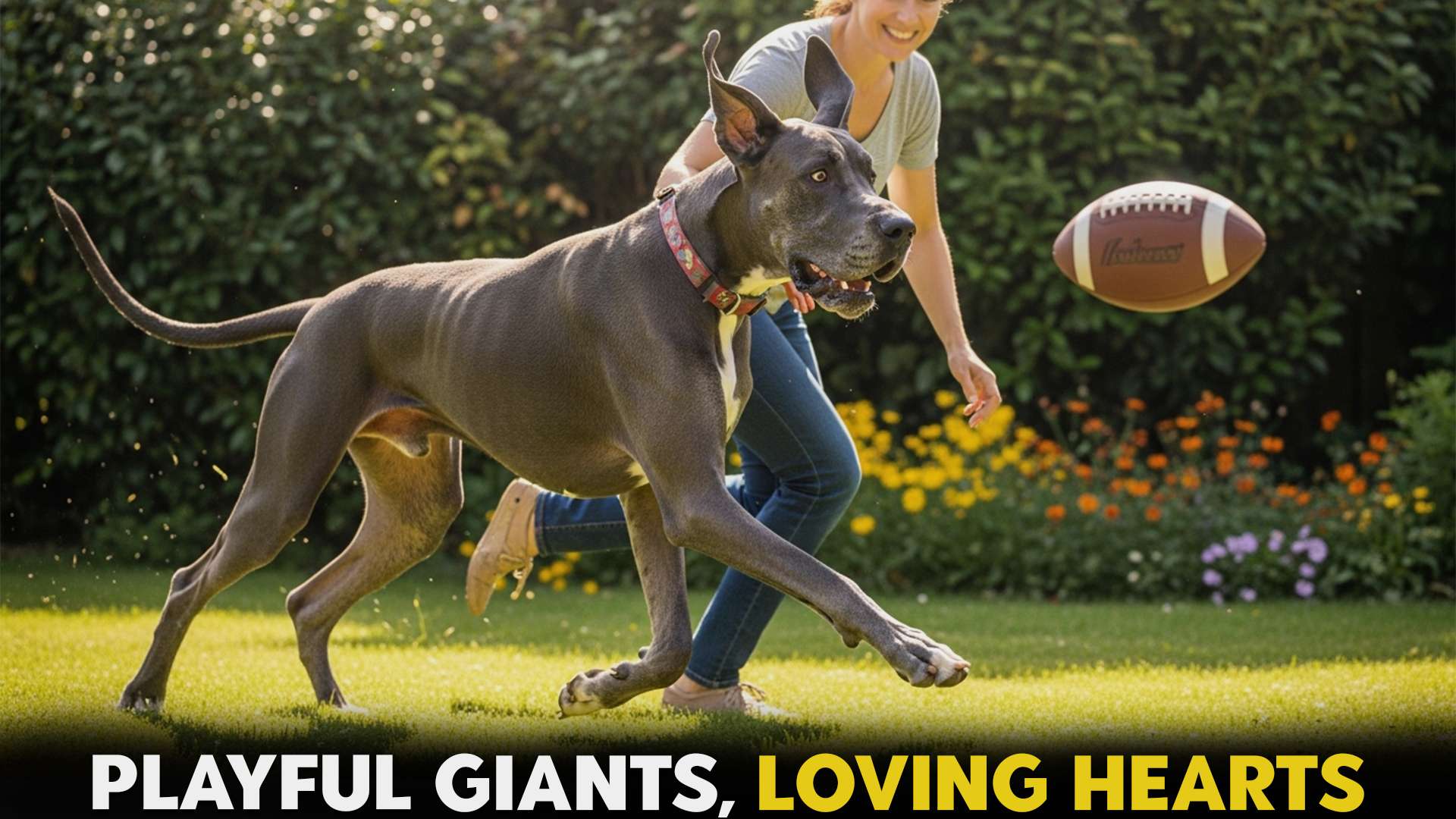Did you know the largest dog ever recorded, a Great Dane named Zeus, stood over 44 inches tall—that’s taller than most 5-year-olds? According to the Guinness World Records, this gentle giant could drink straight from the kitchen sink!
Now imagine a dog so big, its tail can clear a coffee table in one joyful swoosh—but instead of guarding castles, it just wants to cuddle. These colossal canines aren’t just strong; they’re absolute softies wrapped in fur and drool.
You might expect them to be fierce protectors, but surprise—many of them are world-class nap champions and professional goofballs. Their favorite toy? Usually one that fits in your hand, not theirs.
There’s something irresistibly hilarious about watching a “giant” trying to squeeze onto a couch made for humans. Spoiler: the couch never wins.
Get ready to meet the world’s largest dogs—massive in size, bigger in heart, and endlessly playful in spirit.
Largest Giant Dog Breeds Known for Their Playful Nature
1. Great Dane
Once bred by German nobility to hunt wild boars, the Great Dane is a living monument to strength and grace.
Its top rank comes not just from size but from the sheer magnetism of its personality—towering over others while exuding calm confidence. This “gentle giant” has evolved from a fearless hunter to a household snuggle companion who thinks they’re lap-sized.
Despite their size, Great Danes require moderate exercise—daily walks and space to stretch their limbs keep joints healthy. Early obedience training helps manage their enthusiastic greetings and prevent leash pulling.
With Kids: Exceptionally patient and affectionate
Nature: Gentle, loyal, playful
Temperament: Calm but expressive
Drool: High
Bathing Needs: Moderate—every 6–8 weeks
Vet costs can be slightly higher due to heart and joint predispositions, averaging $1,000–$1,500 annually. Ideal for families with room to roam, the Great Dane thrives on companionship and human attention.
2. Saint Bernard
The Saint Bernard ranks second for its legendary mix of power and compassion. Originating in the Swiss Alps as a rescue dog, it was bred to locate travelers trapped in snowdrifts—earning its title as a hero on four legs. Today, it’s still a gentle savior, only now saving hearts instead of hikers.
Though massive, this breed’s energy level is moderate. They prefer short daily walks and love lazing indoors. Consistent brushing keeps their thick coats from matting, and early training helps manage their friendly but weighty enthusiasm.
With Kids: Excellent—tender and patient
Nature: Warm-hearted and reliable
Temperament: Calm, protective
Drool: Heavy
Bathing Needs: Regular grooming, occasional deep baths
Vet and grooming costs hover around $1,200 annually, largely due to their size and shedding. Saint Bernards adore families with time for affection and space for strolls, embodying both guardian and gentle clown.
3. Bernese Mountain Dog
The Bernese Mountain Dog earns its spot for blending mountain-sized devotion with cheerful playfulness.
Originating from Switzerland, these tri-colored beauties once worked on farms, pulling carts and guarding cattle. Their history as hardworking yet kind-spirited dogs explains their balanced nature today.
PDSA claims that Berners need ample outdoor play and cool climates—they dislike heat but love family hikes. Weekly brushing is a must to control their fluffy coat, and obedience training keeps their strong instincts in check.
With Kids: Wonderful—gentle playmates
Nature: Social, affectionate, eager to please
Temperament: Even-tempered, calm
Drool: Light to moderate
Bathing Needs: Monthly or as needed
Expect $1,000–$1,300 per year for vet care and grooming. They flourish in family homes with yards and are best for owners who can balance activity and cuddle time. Their charm lies in loyalty as grand as their frame.
4. Irish Wolfhound
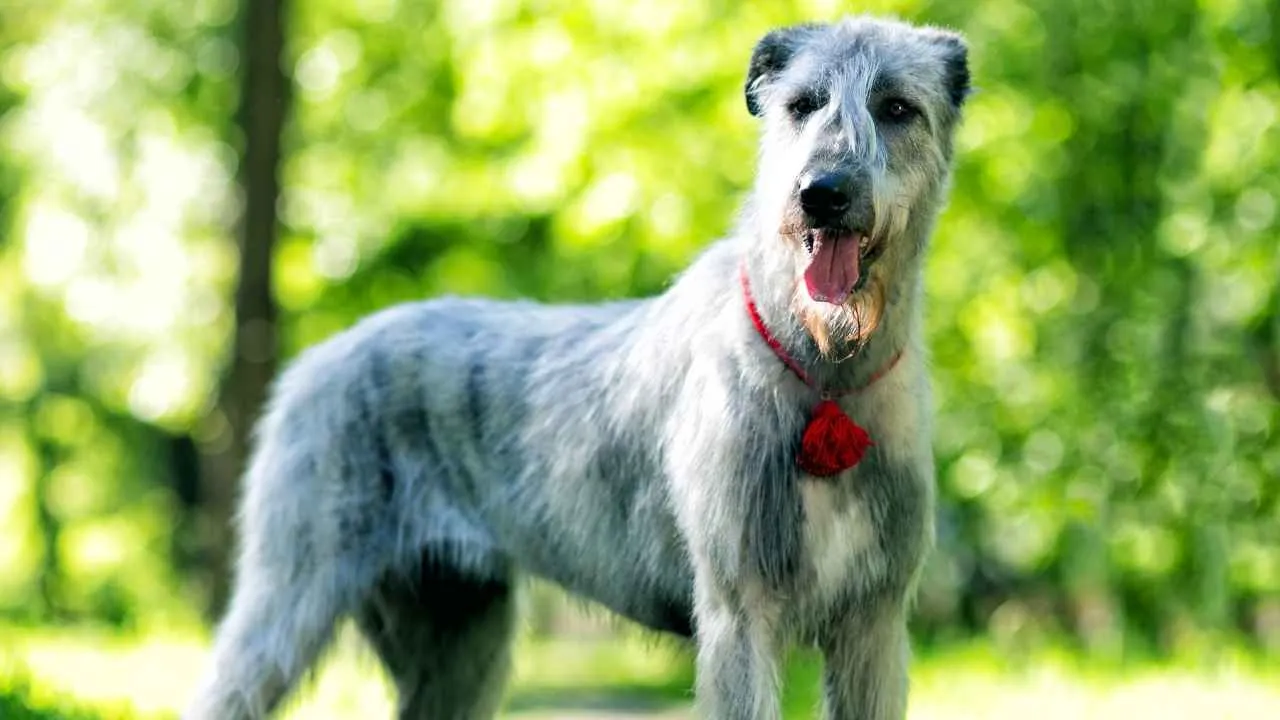
Ancient and awe-inspiring, the Irish Wolfhound stands tall both literally and historically. Once bred to hunt wolves and guard castles, this breed combines regal dignity with a surprisingly tender soul. Its rank stems from that rare blend of towering power and gentle grace.
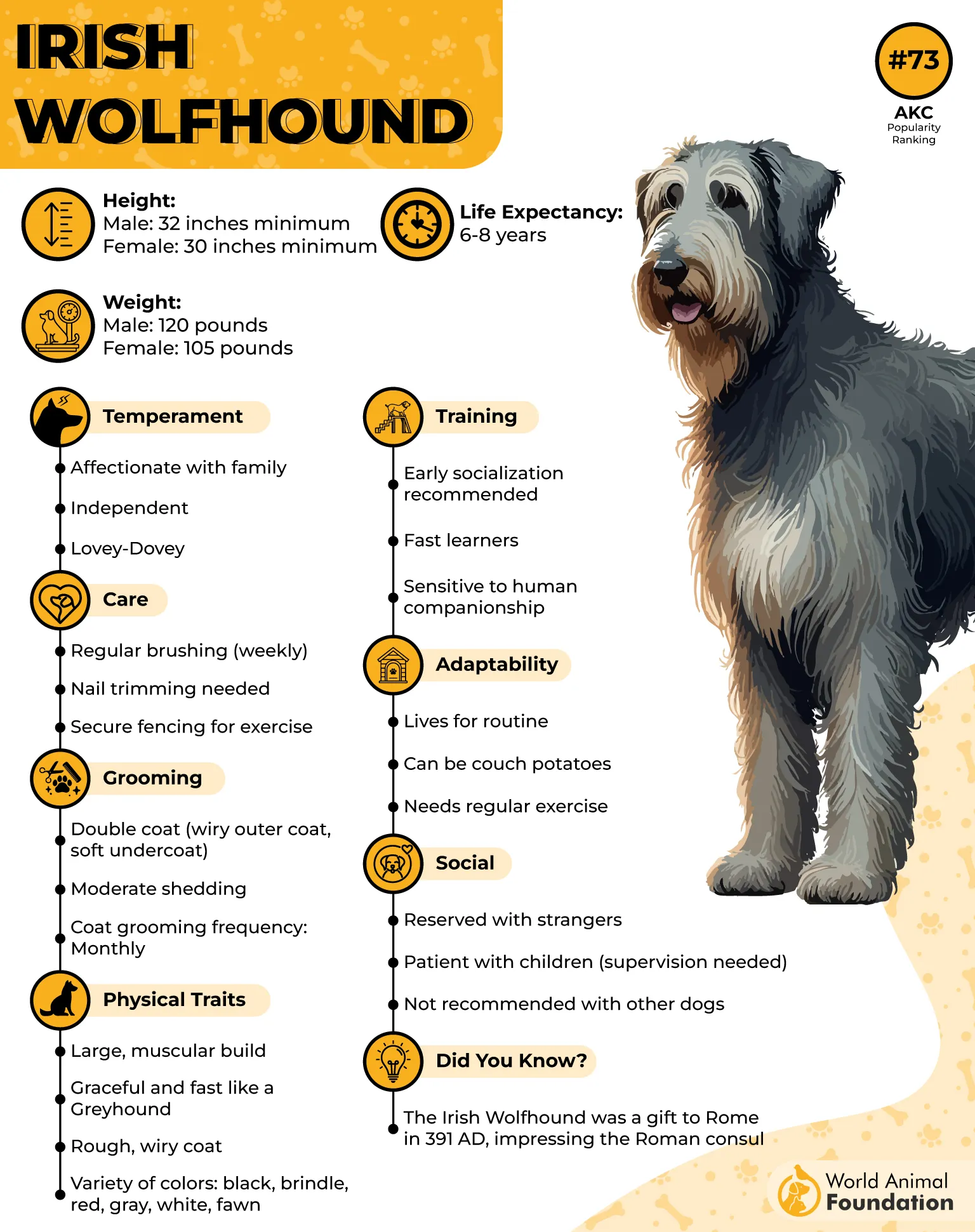
Despite their imposing size, Wolfhounds are low-energy indoors and thrive on a fenced yard and two brisk walks a day. Their wiry coat needs weekly grooming, and early socialization ensures a well-mannered giant.
With Kids: Affectionate but needs supervision (due to size)
Nature: Kind, sensitive, noble
Temperament: Peaceful and loyal
Drool: Minimal
Bathing Needs: Occasional—every few months
Annual vet expenses can reach $1,200–$1,500, primarily for bone and heart checks. Best for calm households with ample space, Irish Wolfhounds form soulful bonds—quiet companions with hearts as tall as their legs.
5. Greater Swiss Mountain Dog
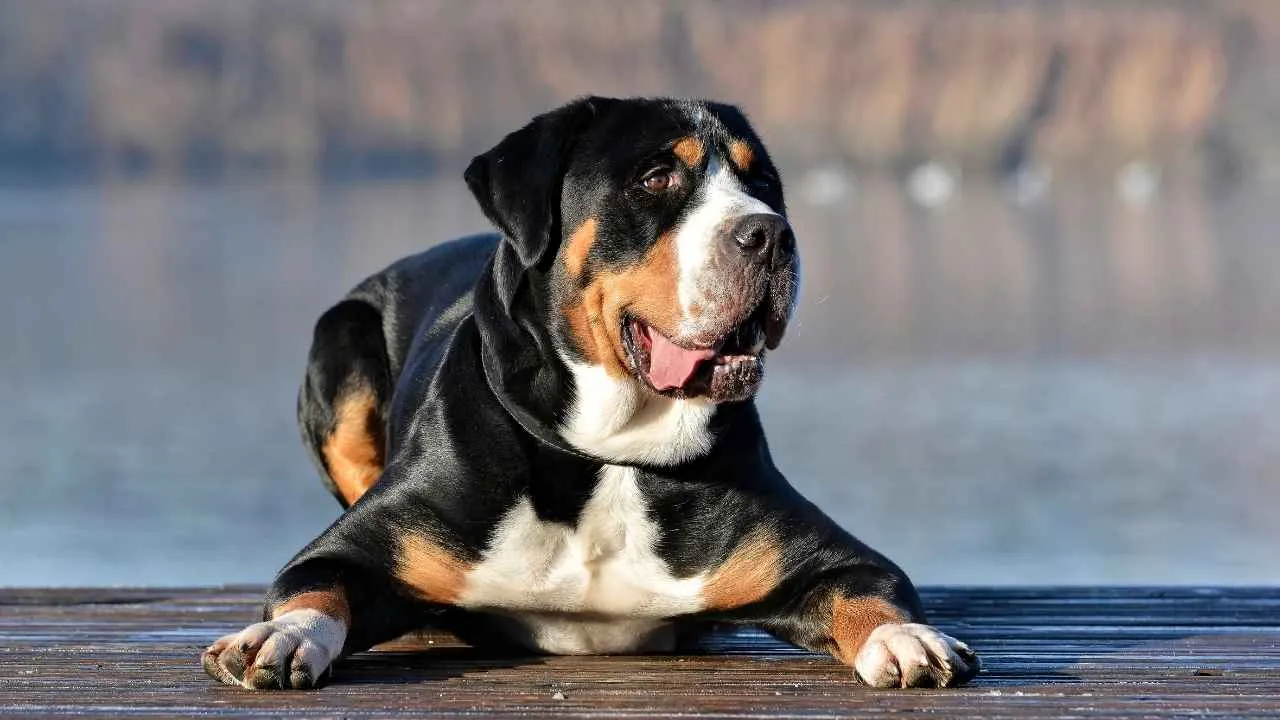
Bred in the Swiss Alps as draft and guard dogs, Greater Swiss Mountain Dogs are sturdy workers with cheerful personalities. Ranking fifth, they balance imposing power with unshakeable friendliness, often forming deep attachments to their humans.
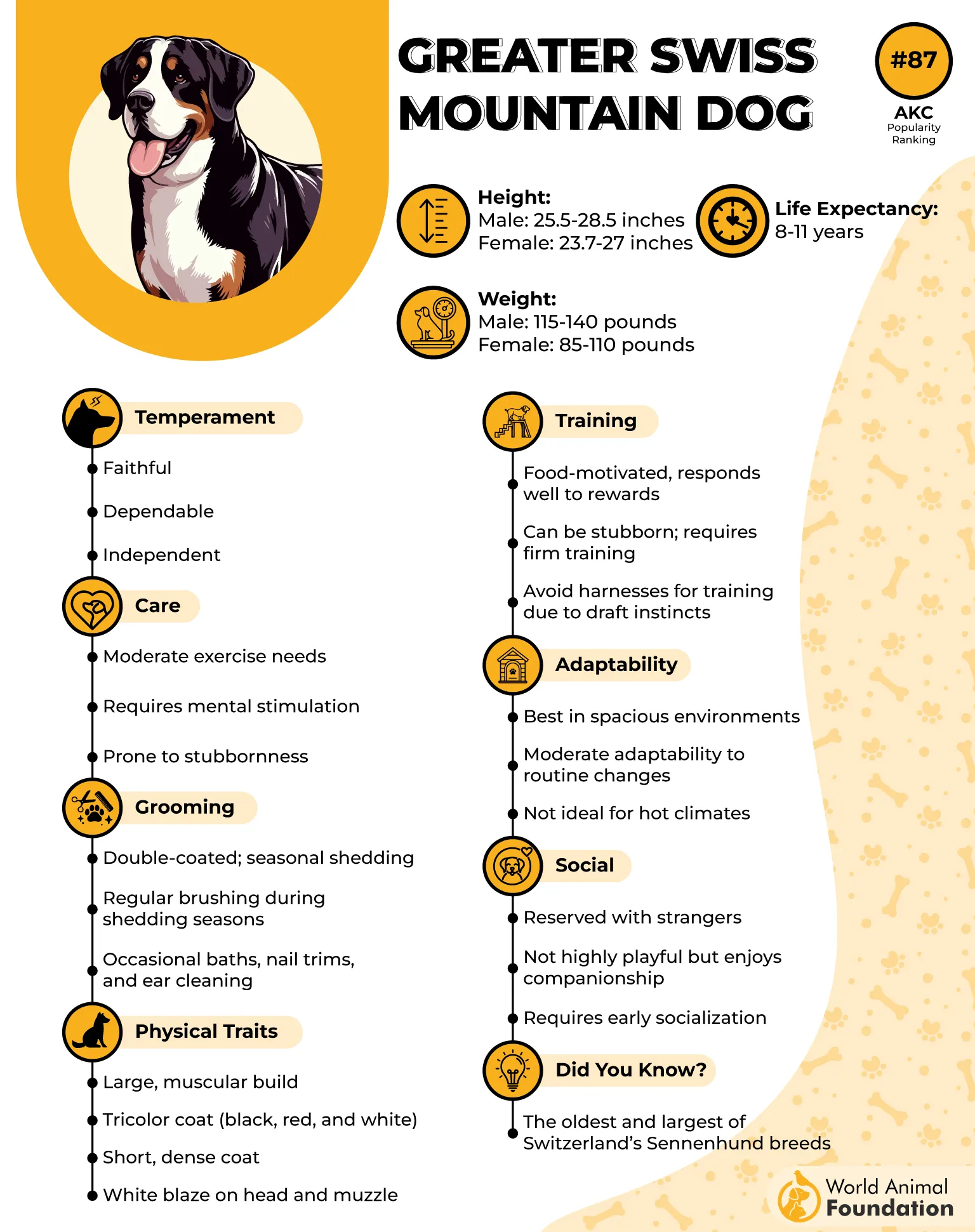
PetMD recommends that these dogs love structured routines—daily walks, mental puzzles, and plenty of social time. Their short, dense coat sheds moderately but requires minimal grooming beyond weekly brushing.
With Kids: Excellent; tolerant and playful
Nature: Loyal and confident
Temperament: Steady, alert, kind
Drool: Moderate
Bathing Needs: Light—every few months
Average care and vet costs sit around $1,000 annually, mostly for hip and joint monitoring. They fit perfectly into active families who appreciate a loyal watchdog with a fun-loving twist. Their charm lies in their steadfast nature and surprising goofiness.
6. Dogue de Bordeaux
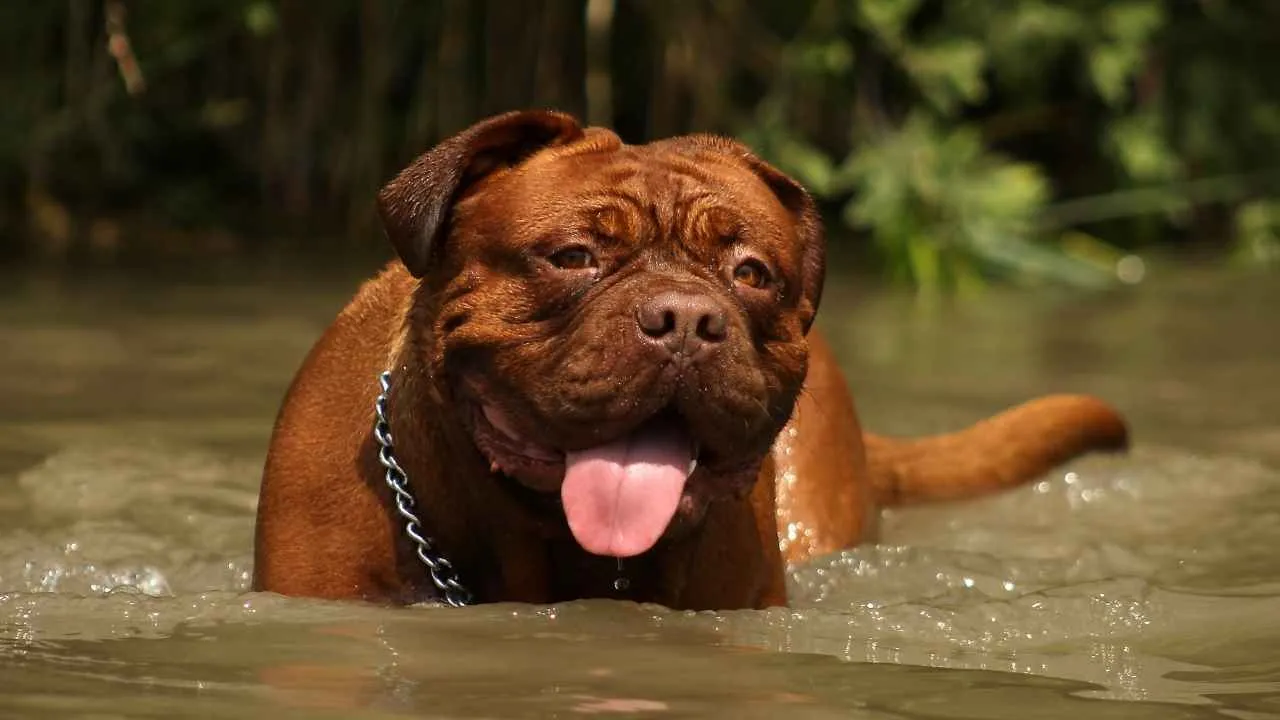
Powerful yet soulful, the Dogue de Bordeaux—France’s oldest Mastiff breed—ranks sixth for its striking mix of strength and sensitivity.
Once used to guard estates and pull carts, it now melts hearts as a devoted family companion. Its massive head and expressive eyes tell a story of courage turned to kindness.
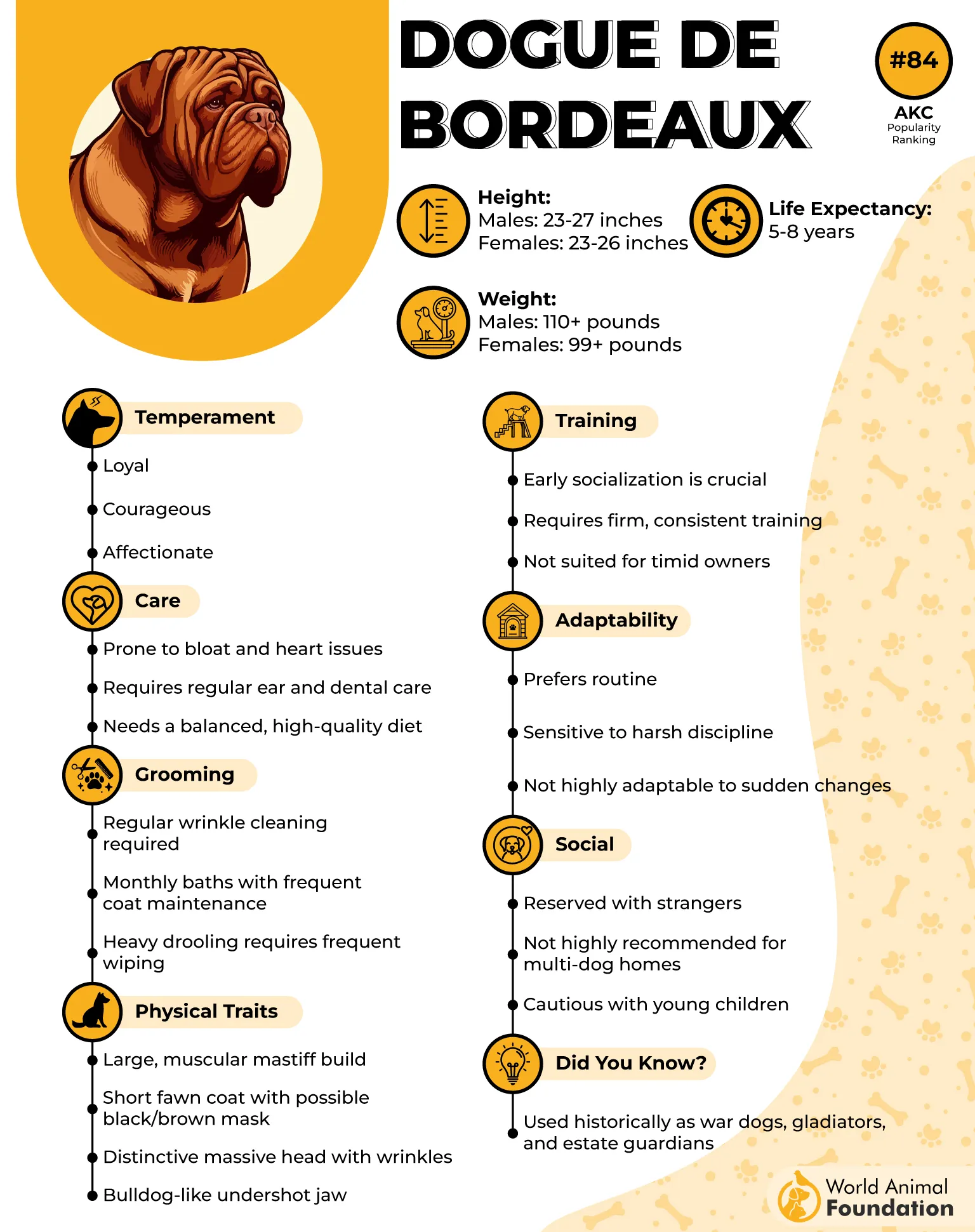
AKC suggests that daily walks and early obedience training are essential to balance its muscular build and independent streak. Grooming is blissfully simple: a quick wipe and occasional bath keep its short coat gleaming.
With Kids: Loving but best with supervision
Nature: Courageous yet tender
Temperament: Calm and deeply loyal
Drool: Very high
Bathing Needs: Minimal
Annual care costs average $900–$1,200, which includes health screenings. Ideal for experienced owners who value a protective yet gentle companion, the Dogue de Bordeaux proves that true strength comes with a soft heart.
7. Giant Schnauzer
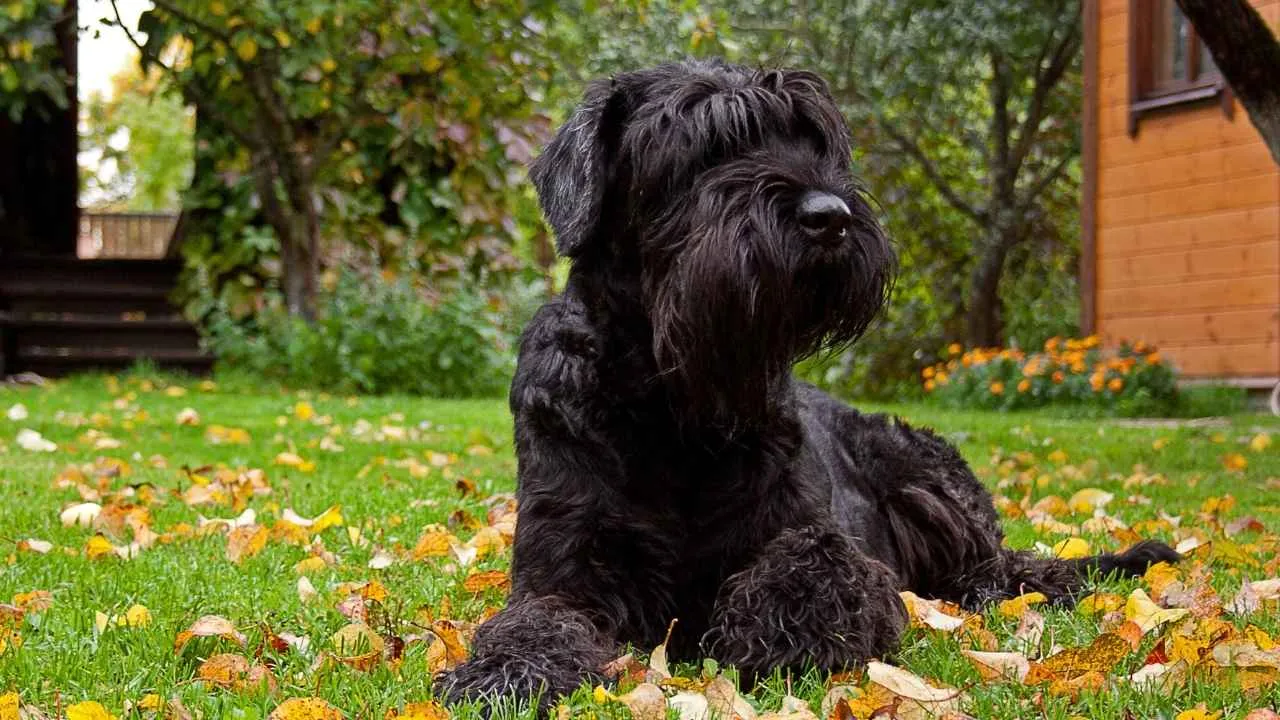
Rounding out the list, the Giant Schnauzer wins admiration for its intellect and energy. Originating in Germany as a farm and guard dog, this bearded powerhouse combines keen intelligence with tireless drive, ranking seventh for its lively spirit in a robust frame.
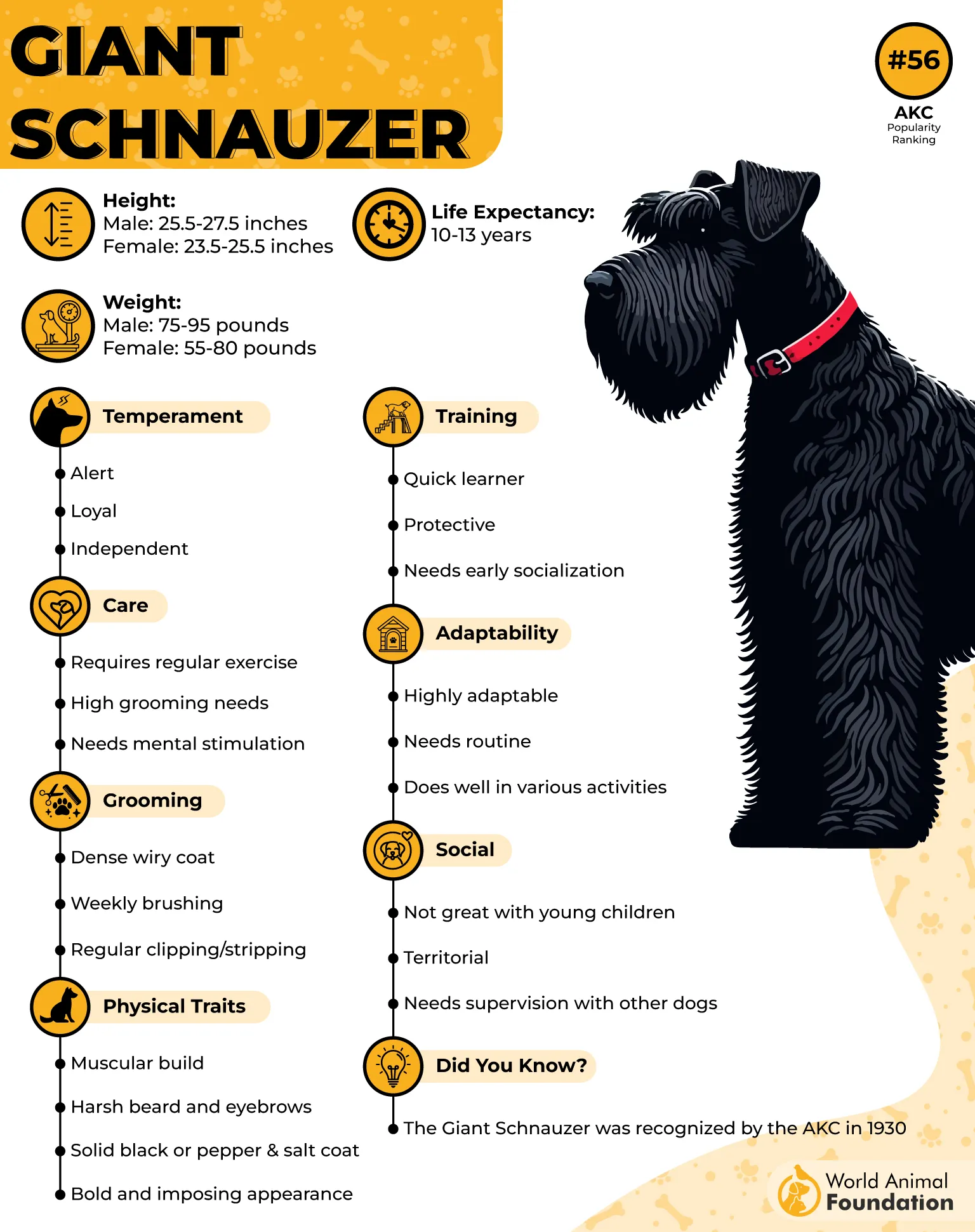
They thrive on activity—jogging, agility games, and mental challenges are essential. Their double coat needs weekly brushing and professional grooming every few months to maintain that trademark Schnauzer look.
With Kids: Great—energetic playmates
Nature: Intelligent, bold, affectionate
Temperament: Alert and confident
Drool: Low
Bathing Needs: Regular trims and maintenance
Annual vet and grooming costs average $1,200–$1,400. Ideal for active owners or families who love outdoor fun, Giant Schnauzers bring energy, loyalty, and laughter in equal measure—a spirited finale to the giant dog lineup.
FAQs
1. Are giant dog breeds good for families with kids?
Yes! Most giant dog breeds are known for their gentle nature, patient temperament, and protective instincts, making them excellent family pets. With proper socialization, they’re calm around small children and form deep, loving bonds with their families.
2. Do playful giant dog breeds need a lot of space?
Generally, yes. These massive dogs thrive in homes with more space for movement and vigorous daily exercise. However, some gentle giants adapt surprisingly well to apartment living if given enough long walks and daily activity.
3. Are giant playful dogs easy to train?
They can be! While intelligent, many large breeds have an independent streak. With consistent training, positive reinforcement, and early obedience work, these powerful dogs become wonderful companions who respect both boundaries and affection.
Conclusion
These giant breeds prove that massive dogs can have the most gentle nature and protective instincts, making them excellent family pets with consistent training and care.
Beyond our list, other giant breeds like the Great Pyrenees, Newfoundland, and Leonberger—known for their thick double coat and patient temperament—were originally bred as massive working dogs but now shine as therapy dogs and wonderful companions.
If you’re seeking a gentle breed with a long history and an incredibly loyal heart, explore these powerful dogs—they might just be your perfect match for an active lifestyle and a home full of loved ones.


